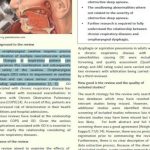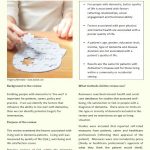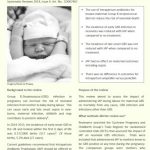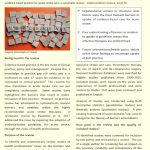A collaborative approach between Lancashire Teaching Hospitals NHS Trust and the University of Central Lancashire for rapidly converting systematic reviews into evidence summaries.
A RaCES team consists of healthcare practitioners and academics who search for evidence to inform practice. Upon identifying a relevant and up-to date systematic review, work begins to convert the review to a short, useful and readable summary. RaCES is a great opportunity to identify evidence for practice and gain academic writing skills. RaCES are published on both the Trust and University websites and prepared for publication in academic journals.
RaCES are supported by the National Institute for Health Research Collaboration for Leadership in Applied Health Research and Care North West Coast (NIHR CLAHRC NWC). The views expressed are those of the authors and not necessarily those of the NIHR or the Department of Health and Social Care
For more information about how to get involved, please email James Hill jehill1@uclan.ac.uk

Do respiratory diseases increase the risk of dysphagia?
An evidence summary based on the following systematic review: Ghannouchi I, Speyer R, Doma K, Cordier R, Verin E. Swallowing function and chronic respiratory diseases: Systematic review. Respir Med. 2016;117:54-64

What helps people with dementia to live well?
An evidence summary based on the following systematic review: Martyr A et al. (2018). Living well with dementia: a systematic review and correlational meta-analysis of factors associated with quality of life, well-being and life satisfaction in people with dementia. Psychological Medicine 48, 2130–2139.

Intrapartum antibiotics for maternal Group B Streptococcus: do they improve neonatal outcomes?
An evidence summary based on the following systematic review: Ohlsson, A. & Shah, V.S. (2014) Intrapartum antibiotics for known maternal Group B streptococcal colonization. Cochrane Database of Systematic Reviews 2014, Issue 6. Art. No.: CD007467.
Now published: Harrison J and Rigby K (2019). ‘Intrapartum antibiotics For maternal Group B Streptococcus: do they improve neonatal outcomes?’ The Practising Midwife, 22(7): 28-31

An evidence summary based on the following systematic review: Baatiema, L., Otim, M.E., Mnatzaganian, G., de-Graft Aikins, A., Coombes, J. & Somerset, S. (2017) ‘Health professionals’ views on the barriers and enablers to evidence-based practice for acute stroke care: a systematic review’. Implementation Science, 12(1):74.
Evidence Based Nursing Commentaries
1. Boland P, Geddes Z, Hill J. Families may benefit from spiritual care in acute settings when loved ones are coming to the end of their lives. Evidence Based Nursing. 2020:ebnurs-2020-103279 DOI: https://doi.org/10.1136/ebnurs-2020-103279
2. Hare M, Hill J, Clegg A. Home-Based Exercise And People With Parkinson’s Disease: A Systematic Review. British Journal of Neuroscience Nursing. 2020;16(5):230-2 DOI: https://doi.org/10.12968/bjnn.2020.16.5.230
3. Harrison J. Student nurses’ gender role is a predictor of caring behaviours and critical thinking. Evidence Based Nursing. 2019;22(3):89 DOI: https://doi.org/10.1136/ebnurs-2018-103029
4. Harrison J, Devereux J. Living a life, not an illness: the process of living well with advanced cancer. Evidence Based Nursing. 2020;23(2):50 DOI: https://doi.org/10.1136/ebnurs-2019-103068
5. Harrison J, Hill J, Palmer K. Identifying risk factors for mortality in patients admitted to hospital with COVID-19. British Journal of Cardiac Nursing. 2021;16(6):1-4 DOI: https://doi.org/10.12968/bjca.2021.0029
6. Harrison J, Timoroksa A-M, Gregary B, Hill JE. Adopting evidence-based guidelines for acute stroke care: barriers and enablers for health professionals. British Journal of Neuroscience Nursing. 2020;16(1):8-11 DOI: https://doi.org/10.12968/bjnn.2020.16.1.8
7. Hill J, Doherty A, Firestone J. Oral health should be considered when working with adults with intellectual disabilities, and larger, higher-quality studies in this area are needed. Evidence Based Nursing. 2020;23(4):119 DOI: https://doi.org/10.1136/ebnurs-2019-103171
8. Hill J, Gomez E, Clegg A. Fathers report experiencing negative feelings and psychological difficulties during the perinatal period. Evidence Based Nursing. 2021;24(3):79 DOI: https://doi.org/10.1136/ebnurs-2020-103287
9. Hill J, Hare M. Statins used for secondary prevention in patients with stroke reduce the risk of further ischaemic strokes and cardiovascular events. Evidence Based Nursing. 2021;24(1):24 DOI: https://doi.org/10.1136/ebnurs-2019-103136
10. Hill J, Harrison J, Raj S, Gregary B, Timoroksa A-M, Gibson J. Mediators, confounders and effectiveness of interventions for medication adherence after stroke. British Journal of Neuroscience Nursing. 2020;16(Sup5):S18-S24 DOI: https://doi.org/10.12968/bjnn.2020.16.Sup5.S18
11. Hill J, Sange C, Clegg A. Alpha<sub>2</sub> agonist dexmedetomidine may reduce duration of delirium in critically ill adults. Evidence Based Nursing. 2021;24(3):91 DOI: https://doi.org/10.1136/ebnurs-2019-103215
12. Hill J, Smith C, Clegg A. Probiotics may be considered for children and adults with cystic fibrosis. Evidence Based Nursing. 2021;24(3):87 DOI: https://doi.org/10.1136/ebnurs-2020-103272
13. Hill JE, Christian D, Shaw K, Clegg A. Weight loss interventions as an option for a lifestyle treatment in urinary incontinence. British Journal of Community Nursing. 2020;25(12):616-9 DOI: https://doi.org/10.12968/bjcn.2020.25.12.616
14. Palmer K, Hill J, Clegg A. One in 10 hospitalised patients have a pressure injury worldwide. Evidence Based Nursing. 2021;24(3):93 DOI: https://doi.org/10.1136/ebnurs-2020-103276
15. Palmer K, Hill J, Clegg A. There is inconsistency in the effect of empathy training for healthcare professionals and students. Evidence Based Nursing. 2021;24(3):80 DOI: https://doi.org/10.1136/ebnurs-2020-103292
16. Palmer K, Hill J, Clegg A. Multifaceted falls prevention can help to reduce fall rates in high-risk and healthy community-dwelling older adults. Evidence Based Nursing. 2021;24(3):83 DOI: https://doi.org/10.1136/ebnurs-2020-103291
 In this section
In this section